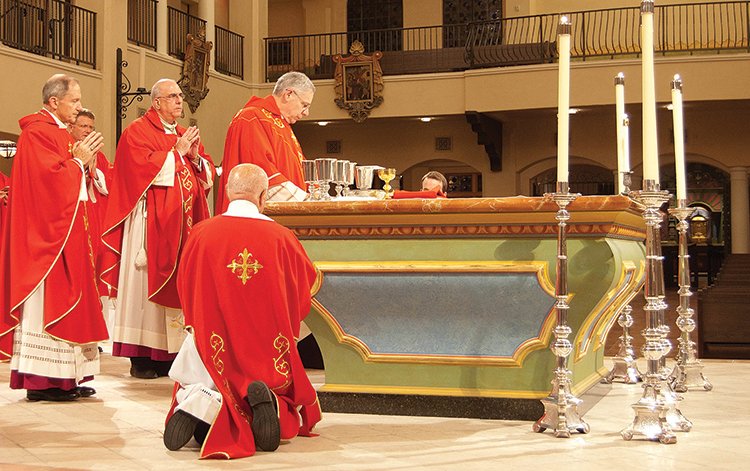
Bishop Robert W. Finn celebrates the annual Red Mass Oct. 23 at Visitation Church in Kansas City, Mo. Concelebrating with Bishop Finn are Bishop Thomas J. Paprocki of the Diocese of Springfield, Ill., left, and Archbishop Joseph F. Naumann.
by Joe Bollig
joe.bollig@theleaven.org
KANSAS CITY, Mo. — Members of the Catholic Lawyers Guild of Kansas City were urged to follow the example of St. Thomas More and be faithful as they engage the world at the annual Red Mass held Oct. 23 at Visitation Parish here.
It is called a Red Mass because of the color of the vestments worn by the celebrant. The color red symbolizes the Holy Spirit.
The Red Mass, organized by the guild, is a time for judges, attorneys and officeholders to ask for the intervention of the Holy Spirit as they fulfill their responsibilities.
The main celebrant at the Red Mass was Bishop Robert W. Finn of the Diocese of Kansas City-St. Joseph.
Concelebrants included Archbishop Joseph F. Naumann of the Archdiocese of Kansas City in Kansas; Bishop Thomas J. Paprocki of the Diocese of Springfield, Ill.; and five priests. Two deacons assisted.
Bishop Paprocki has been a member of the Illinois bar for 32 years and a canon lawyer for the past 22 years.
In his homily, Bishop Paprocki held up St. Thomas More, the patron saint of lawyers and politicians, as an example of integrity and holiness.
“Thomas More is remembered today as a saint,” said Bishop Paprocki, “a man who was devoted to Christ and his church, and who willingly sacrificed his power, his wealth and security — and, ultimately, his life —out of love for God.”
More, who was lord chancellor of England under King Henry VIII, was beheaded at the order of the king because he would not assent to an act of Parliament that made King Henry VIII supreme head of the church in England, nor to an oath renouncing the authority of the Catholic Church in religious matters.
Bishop Paprocki called on guild members to engage the world through faith, even as they keep their eyes fixed on heaven.
“Specifically, as Christians and citizens, we are obliged to work for justice and promote the common good — an obligation that is especially meaningful in a democratic society,” he said, “where a government . . . possesses limited constitutional authority to care for the common good, and where the balance is entrusted to the care of nongovernmental institutions . . . including churches.”
Since Catholics are a minority in this area of the country, Bishop Paprocki urged an ecumenical alliance to fight for common values.
“I believe it is important that we find common ground to work with our fellow brothers and sisters baptized in Christ,” said the bishop. “In this regard, I was pleased to see the recent interview in The Wall Street Journal with Russell Moore, the new president of the Southern Baptist Convention’s Ethics and Religious Liberty Commission.”
“In that interview,” he continued, “Mr. Moore said that he wants to refocus the evangelical movement on serving as a religious example battling in the public square on ‘three core issues’ — life, marriage and religious liberty. I wholeheartedly agree with this agenda and pray that there will be fruitful cooperation between Catholics and other Christians on these core issues.”
The biggest obstacle to promoting and protecting the three core issues is apathy or, in more specific and theological terminology, acedia. This, one of the seven capital sins, is also known as sloth, said Bishop Paprocki.
“The capital sin of sloth refers to a spiritual sluggishness . . . which refuses the joy that comes from God and is repelled by divine goodness,” he said.
Another obstacle in the way of the promotion and protection of the three core issues is an improper understanding of conscience, said the bishop.
“Too many Catholics,” he said, “have justified their rejection of Catholic teaching on human sexuality, marriage and family life as a matter of following their ‘conscience,’ but apparently without properly understanding what ‘conscience’ means.”
For Catholics, a properly formed conscience means to share God’s knowledge and the church’s teaching about right and wrong, he said.
When St. Thomas More invoked conscience against King Henry VIII, he was declaring that he was not following a personal preference, but was thinking with the mind of the church.
Before the dismissal, the guild recognized Kansas City, Mo., attorney Martin M. Meyers with its St. Thomas More Award.
Meyers, a graduate of Rockhurst High School and the University of Missouri–Kansas City School of Law, has been an attorney for 30 years.
He was recognized as a “super lawyer” in Missouri and Kansas for 2005 to 2011, and named one of the Best Lawyers of America for 2003 to 2011. He owns The Meyers Law Firm of Kansas City, Mo.
Meyers is a religious emblems chairman of the Catholic Committee on Scouting for the Diocese of Kansas City-St. Joseph, a member of the board of regents of Conception Seminary College, and a member of Visitation Parish.
“His faith is what drives his practice,” said Chris Kopecky, guild president. “When he goes to trial, he truly tries to help someone who might be underrepresented or disadvantaged by someone. I think he considers himself a great equalizer. Working from his faith and spirituality, he really tries to make a difference and get justice for that person.”
There was a reception held in the social hall following the Mass.






